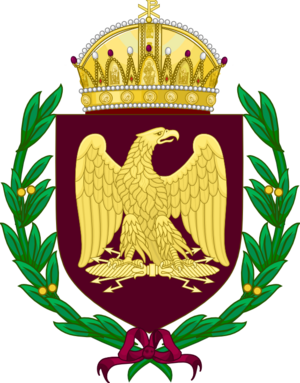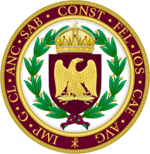Emperor's Council of Latium
 | |
| Abbreviation | Emperor's Council, CI |
|---|---|
| Formation | 597 |
| Legal status | Advisory body and cabinet |
| Constantine XX | |
| The Duke of Ossonoba | |
| Alexander Pompilius | |
First Secretary | Sir Romulus Vibius |
Staff | Imperial Council Office |
| Website | consilium.gov.la |
The Advisors to the Emperor (Consilium Imperatoris), commonly referred to as the Emperor's Council or the Council, is a formal council of advisors to the Latin Emperor, and organ of the executive whereby the Monarch and his or her ministers, or Magistrate-Councillors, direct the government. It's membership is composed of senior politicians, nobles, and other state officials.
It is composed of the Monarch, the 8 Great Officers of State, the Consul, 13 Magisterial officers, and any number of other court roles or officers elevated to the Council at the sole discretion of the Monarch. Councillors are appointed by the Monarch, though Councillors holding a Magisterial office require Senate confirmation. Councillors serve at the pleasure of the Monarch, who may dismiss them without cause. Councillors of magistrate standing may also be removed by the Senate during traditional expulsion proceedings, as Magistrate-Councillors must be seated Senators throughout their tenure on the Council, though this has never successfully happened.
History
Committees
The Council consists of a number of standing committees. The most prominent committees include:
- National Defense Council
- Committee of Affairs for Lipara and Caesarian Provinces
- Imperial Judicial Committee
- Board of Trade
- Naval Board
Great Officers of State
Traditionally there are six Vir illustris (literally, illustrious men) or great officers of state, with the offices of Master of the Seal and Lord Admiral as later additions in the 11th century. The highest ranking Great Officer of State is the Master of Offices (Magister Officorum), who is typically the Monarch's most trusted advisor. Traditionally, the Master of Offices also holds the title of Count of the Chancery though this was not the case during a council of Jason VI Augustus's where the two offices were held by separate individuals (Empress Marsella as Master of Offices; Michael Pinarius as Count of the Chancery.)
Membership
The council consists of the eight Vir illustris, and any other individual appointed to the Council by the Monarch. Since the early 20th century, these extra members have included Senators appointed to Magisterial office, as well as extraordinary offices of now magisterial rank, including Private Secretary to the Emperor, Urban Prefect, and Palatine Counsel. While not regular attendees, the Director of the Frumentarii, and the Director of the SPI often attend for matters of national security when a full meeting of the National Defense Council cannot be held. Other non-officers may regularly attend meetings as an Aid-in-Council or Comes consistoriani (literally, Count in the aid of the council), whom are appointed at the sole discretion of the Monarch.
Oath
Current members
Great Officers of State
The Great Officers of State (Vir illustris) are traditional ministers of the Monarch who are appointed to exercise traditional court functions and powers in concert with the government. While still offices of actual function, the powers of the Great Officers of State have waned since the 19th century and the expansion of the Council to include 7 (currently 13) magisterial offices to advise the Monarch and aid in government. Many functions of the Great Officers of State now exist today in operation of the Imperial Household, and Household duties, though many still include day-to-day government duties.
| Office | Member | Appointed | Duties | |
|---|---|---|---|---|
| Great Officers of State (Vir illustris) | ||||
| Master of Offices Magister Officorum |

|
The Duke of Ossonoba | 12 January 2018 | Leads and directs the Council; chief advisor; directs civil service |
| Count of the Chancery Comes Cancellariae |
File:MarsellaAtmos2.jpeg | HIM The Dowager Empress | 7 January 2017 | Responsible for regulating peers; ensuring the independence of the courts |
| Master of Soldiers Magister Militum |

|
The Lord Vipsanius of Tibur | 21 September 2016 | The Monarch's chief military advisor; also serves as General Chief of Staff of the Armed Forces |
| Count of the Private Fortune Comes rerum privatarum |

|
Laurentius Verrucosus, Count of Suasa |
16 January 2017 | Oversees the Imperial purse; Responsible for the Monarch's personal estate and finances; office held by the Chancellor of the Duchy of Roma |
| Master of the Sacred Chamber Magister sacri cubiculi |

|
The Duke of Capena | 9 March 2017 | Responsible for the Monarch's household; Also Master of Horse |
| Praetorian Prefect Praefectus praetorio |
John Santella | 18 November 2005 | Responsible for the Monarch's security; commander of the Praetorian Guard | |
| Master of the Seal Magister sigillum |

|
The Duke of Samnium | 17 April 2005 | Responsible for the Monarch's personal seal |
| Lord Admiral Dominus praefectus classis |

|
HIH The Duke of Beroea | 12 February 2007 | Chief officer of the Imperial Navy; head of the Naval Board |
Magisterial Offices
Magistrates are government ministers that serve as head of a government department. Magistrates are appointed by the Monarch, and serve at his pleasure, after Senate confirmation. By modern convention, the Consul, as head of government is afforded the ability to advise the Monarch on certain appointments in order to achieve successful confirmation of magistrates. While there is no set term for magistrates, most often magistrates are appointed after a general election. Magistrates are required by edict to be sitting Senators, and resignation or loss of a Senate seat results in resignation of the magistrate office.
| Office | Member | Party | Appointed | Duties | |||
|---|---|---|---|---|---|---|---|
| Magisterial-level offices | |||||||
| Consul | 
|
Alexander Pompilius | United Latium | 11 March 2016 | Chief magistrate, head of government and speaker of the Senate | ||
| Aedile First Magistrate |

|
Alexandra Sulpicia | United Latium | 21 April 2017 | Responsible for internal affairs, immigration and citizenship, and local police | ||
| Magistrate for Foreign Affairs | 
|
The Duke of Narona | United Latium | 17 October 2018 | Foreign Office | ||
| Magistrate for the Treasury | 
|
The Lady Lupeia | Independent | 11 March 2016 | Responsible for economic and financial matters | ||
| Magistrate for Justice | 
|
Peter Abronius IA | Independent | 27 February 2016 | Responsible for courts, prisons, and the Justice Office | ||
| Magistrate for Healthcare and Social Services | 
|
Justin Marandicius | United Latium | 11 May 2016 | Responsible for the National Health Service (SMH) and social services | ||
| Magistrate for Education | File:ElisabettaTrenta (cropped).jpg | Maria Plautia | United Latium | 3 June 2016 | Responsible for education, universities, etc. | ||
| Magistrate for Business and Energy | 
|
The Count of Samnia | Independent | 11 March 2016 | Responsible for business, industrial strategy, and science and innovation with energy | ||
| Magistrate for Environment | 
|
Flavius Genucius | United Latium | 11 March 2016 | Responsible for environmental protection, food production and standards, agriculture, and fisheries | ||
| Magistrate for Housing and Local Government | 
|
John Daedalus | United Latium | 26 January 2018 | Responsible for housing, communities and local government | ||
| Magistrate for Culture, Media, and Sport | 
|
Emilian Potitius | United Latium | 21 April 2017 | Responsible for culture, sport, media, tourism, and creative industries | ||
| Magistrate for Transport | 
|
Felix Mallius | United Latium | 21 April 2017 | Responsible for transportation, and roads | ||
| Magistrate for International Development | 
|
Anna Preda | Independent | 26 January 2018 | Responsible for promoting development overseas | ||
Extraordinary members
| Office | Member | Appointed | Duties | |
|---|---|---|---|---|
| Extraordinary councillors | ||||
| Private Secretary to the Emperor | <imgur w=75>ChiwZA8.png</imgur> | Theodotus Selicius | 12 December 2018 | Senior operational member of the Imperial Household; responsible for the official program and correspondence of the Emperor |
| Quaestor of the Palace | <imgur w=75>U5Jsi6P.png</imgur> | Sergius Acilius IA | 27 February 2016 | Advising on all legal aspects of policy questions, handles Imperial pardons, reviews legislation and Imperial statements |
| Aide-in-Council | 
|
HIH The Prince Leo | 1 June 2018 | Additional appointee to the Council |
